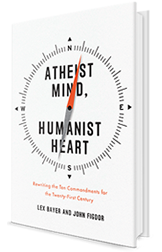

Crowd sourcing the Ten Commandments for the 21st century


$10,000 in prizes have been awarded to these ten winning beliefs as selected by the panel of judges.
|
Be open minded and be willing to alter your beliefs with new evidence.
|
Why It is essential in order for us to be able to collaboratively work together to find common solutions to pressing world problems. |
|
Strive to understand what is most likely to be true, not to believe what you wish to be true.
|
Why We're more likely to believe what we wish to be true over what we wish not to be true, regardless of veracity. If we’re interested in learning the truth, then we need to actively separate our beliefs from our desires. |
|
The scientific method is the most reliable way of understanding the natural world.
|
Why Every time humans have questions this method is used to solve them. If we don't know, we don't know but instead of making up the answer we use this method to reach a conclusion/answer. |
|
Every person has the right to control over their body.
|
Why This includes a person\"s right to not be murdered, raped, imprisoned without just cause (violating another person\'s rights), kidnapped, attacked, tortured, etc. This also protects a person\'s freedom of speech and freedom to dress and represent themselves as they so choose. |
|
God is not necessary to be a good person or to live a full and meaningful life.
|
Why When one does a good deed it isn't because God tells one to do a good deed, but because one simply wants to be good person. As Human beings we are capable of defining our own, different, meanings for our lives, with or without a god. |
|
Be mindful of the consequences of all your actions and recognise that you must take responsibility for them.
|
Why It may sound obvious, but negligence and refusal to take responsibility are an immense source of harm in the world, from interpersonal relations to Global issues. |
|
Treat others as you would want them to treat you and can reasonably expect them to want to be treated. Think about their perspective.
|
Why If everyone did their best to carry this out as far as it can go, everyone would get along much better. |
|
We have the responsibility to consider others including future generations
|
Why As human beings, we have great power. As Voltaire noted "With great power comes great responsibility." To not consider others would be selfish and petty. We have demonstrated the ability to be magnanimous, are rapidly becoming more so, and will be even more so in the near future. |
|
There is no one right way to live.
|
Why If you look, even a little, you find many cultures living in moral societies that are fundamentally different, with only a few very basic principles being adhered to between them. Just because one group is different, does not mean they are wrong. |
|
Leave the world a better place than you found it.
|
Why The Japanese concept of Kaizen teaches that small incremental improvements can have a profound effect over time. We should all strive to leave the world better than we found it be it through relieving the suffering of others, creating works of art, or passing along knowledge. |
The 2804 beliefs expressed in the Rethink Prize competition were analyzed using various text mining and data visualization techniques. The results can be seen by clicking on the images below:
Carl Michael Marr (Washougal, WA), Carol Fly (Austin, Texas), Christopher Lager (Fayetteville, AZ), Eli Chisholm (West Des Moines, IA), Jamie Andrews (Stafford, United Kingdom), Jeremy Jimenez (San Francisco, CA), John Roso (Nashville, TN), Isaiah Jackson (Raleigh, NC), Matthew Main (Brooklyn, NY), and Maury McCoy (Austin, Texas)

ORDER NOW AT
Atheist Mind Humanist Heart
Rewriting the 10 Commandments for the 21st century
Silicon Valley technology entrepreneur Lex Bayer and Stanford University humanist chaplain John Figdor turn conventional perceptions about atheism on their head. They show that atheism need not only be opposed to religion and God, but can also provide a clear set of constructive principles to live by that establish atheism as a positive worldview. Following a philosophical approach grounded in logic and evidence, Bayer and Figdor take us on an inspiring journey to discover how to live a reasonable, ethical, and happy life without God. And readers are encouraged to self-reflect and ultimately uncover their own set of personal beliefs.
Learn More